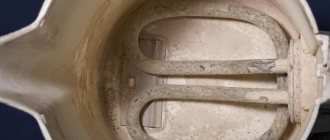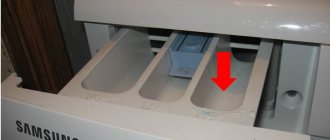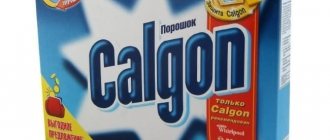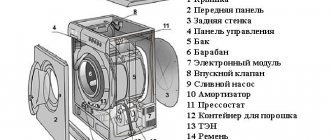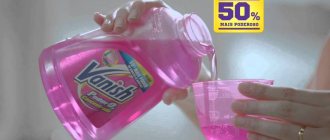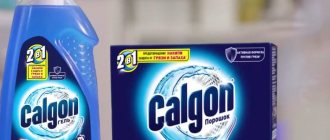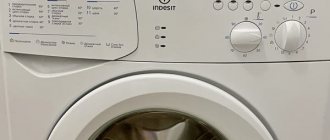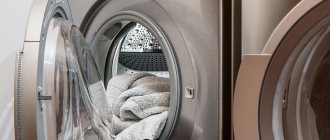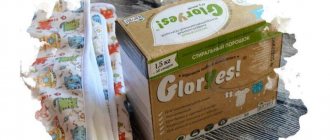The service life of household appliances largely depends on operating conditions, which do not always depend on the user. The water consumed by washing machines rarely has the characteristics recommended by washing machine manufacturers. Special products, including the famous Calgon, can normalize the parameters of washing water. Many have heard about it, but have not put it into practice due to little information about the product. This material will help you learn about the properties of a popular product. After reading it, you will learn how to use Calgon, where to put it when washing, and also make a conclusion for yourself whether to use it or not and whether it is really effective.
Do you need Calgon for washing?
The main function of Calgon for washing machines is to reduce water hardness. Washing in soft water reduces the formation of scale on the heating element and other parts of the machine. Limescale deposits on the heater can lead to its burnout, which will require repairs. If you have been using your washing machine for a long time using hard water, then it is worth descaling. You can read more about this here.
To decide whether to use Calgon or not, you need to find out what it does and what its advantages are. Calgon performs a number of important functions.
- Reduces washing powder consumption. In soft water, the consumption of cleaning agents and detergents is less.
- Softens water, which improves the quality of washing clothes.
- It prevents white items from turning gray when washed by normalizing the calcium content in the water.
- Prevents the formation of scale inside the washing machine.
- After washing, laundry becomes softer to the touch.
The benefits and benefits of using Calgon for washing machines and laundry are clear, but many are also interested in another question: is this product harmful to health? Most experts agree that the components included in the composition do not have a negative effect on human health. An exception may be people with hypersensitivity to substances contained in the product. This can manifest itself in allergic reactions causing redness and irritation of the skin.
Despite the general harmlessness of Calgon, it is better to use basic precautions. Wear rubber gloves before use and store Calgon in a dry, dark place out of the reach of children. If the product accidentally gets on the mucous membranes of the eyes, nose or mouth, immediately rinse them under running water and consult a doctor.
Packaging
- Powder packages are produced in packs weighing 0.55 kg, 1 kg, 1.6 kg.
- Tablets are packaged in quantities of 12, 15, 32, 35, 40 and 70 tablets per pack.
- The gel is bottled in plastic bottles of 0.75, 1.5 and 2 liters.
Regardless of the release form, as long as the dosage indicated on the package is observed, the concentration of active substances in the water of the washing machine will be the same.
Summarize
If you are worried about the condition of your washing machine and want to protect its internal parts from scale formation and at the same time save your family budget, then here are some recommendations:
- Wash less often on modes with temperatures above 40 degrees;
- Use high-quality washing powder;
- Clean with citric acid every 3-6 months.
How to replace Calgon?
To extend the life of the washing machine, manufacturers recommend using water softeners when washing. Not only can Calgon reduce water hardness, there are other similar products that can be used instead.
Many powders contain water softening components. There are also special filters on sale that normalize water hardness. They can be used instead of Calgon. Purchasing and installing such a filter has an advantage. Water with normal hardness will be used not only by a washing machine, but also by other household appliances.
Soda ash can also replace Calgon when washing. You can learn more about the properties of soda in this material.
Other water softeners
In addition to Calgon, there are other products used to soften the water in the machine. They are less popular and cheaper.
Instead of the advertised product, you can use Alfagon. When using it, the cost of washing clothes is halved. You can even soften it with baking soda. In this case, the costs will be minimal.
If there is already scale on the heating element of the machine, it can be removed using means intended for this purpose. Also a substitute is “Eona anti-scale”. It softens and acidifies water. This prevents scale formation and increases washing efficiency.
How to use Calgon?
The dosage of Calgon is indicated in the instructions for use. It can be found on the product box. The instructions for use indicate that the amount of Calgon per wash depends on the degree of water hardness. The harder the water, the higher the dosage. You can find out how much product you need from the instructions. It contains the following values:
- for water of medium hardness you will need 32 ml or a third of a measuring cup;
- for hard water you need to add 64 ml (2/3 cup);
- for high-hardness water, 96 ml is required, which is the volume of a full glass.
Based on the instructions for use, Calgon should be poured into the detergent drawer along with the washing powder into the washing machine. There is no need to pour water softener onto the laundry in the drum. Although Calgon does not have a negative effect on fabric, it is better to add it to the tray. Having mixed with the powder in the cuvette of the machine, the Kalgon machine will perform its functions.
To find out how to use Calgon tablets and how many pieces to add, please refer to the instructions. It says that for a single wash you need one tablet, regardless of the degree of water hardness. When using the product, proper effectiveness can be achieved by adding it to each wash. The information on the packaging says that since the wash will be done in soft water, you need to take this into account when adding washing powder.
It is sometimes more convenient to use Calgon in tablets than in powder, and the effectiveness does not depend on the form of release. Putting in a tablet is easier than adding a certain amount of powder. The product is also available in the form of a gel; regardless of this, the general composition is similar to tablets and powder. The gel should also be added to the tray where the washing powder is poured.
Forms
The drug Calgon is available in several different forms:
- Powder. Packaged in cardboard boxes and plastic soft packaging of different weights. The inconvenience of this option is the difficulty of dosing.
- Pills. Sold in boxes. Minimum packaging – 12 tablets in one package. The advantage of this option is that it is impossible to make a mistake with the dosage.
- Gel. Sold in polymer bottles and canisters of various sizes. The gel is convenient to use, the packaging is compact, and in addition, incomplete dissolution of the drug is avoided.
Composition of Calgona
The substances included in Calgon help improve the quality characteristics of water for washing in a washing machine. It consists of the following components:
- sodium tripolyphosphate - reacts with calcium ions contained in water and is the basis of the product;
- polycarboxylates - make up 30% of the composition;
- microcrystalline cellulose - content does not exceed 15%;
- polyethylene glycol - the product contains no more than 5%.
The composition also includes surfactants, known to many surfactants. The main job of softening water is performed by sodium tripolyphosphate due to its interaction with calcium ions. “Softener” has a light, pleasant aroma that will not affect the freshness of washed items.
Who produces?
The Calgon trademark belongs to the large company Reckitt Benckiser. This company was founded in 1814 in England by entrepreneur Derek Colman. The company was originally called Colman's and was engaged in the production of flour and mustard. In 1840 the company acquired a starch mill and was renamed Reckitt & Sons. Somewhat later, the company’s plant began producing polishing and washing products.
In 1823, the company's management founded a business in Germany producing exclusively cleaning products and various household goods. In the same year, the company for the first time began supplying the market with Calgon, intended for water softening. The composition of this softener was developed by the company’s specialists and remains virtually unchanged to this day.
In 1999, the company merged with the German company Benckiser NV. As a result, a new manufacturer of household chemicals, Reckitt Benckiser, appeared on the market. By this time (since 1994), the company already had an office, including in Moscow.
Does Calgon really help?
There is a skeptical opinion among experts about the effectiveness of Calgon. Reviews from some consumers completely question the benefits of using this product. Regardless of how much Calgon was poured in, they were unable to achieve a positive result. In order not to stir up discussions, experts conducted laboratory studies in which they found that the effectiveness of Calgon does not correspond to advertising promises, and the benefits for washing are very questionable. The composition of Calgon is similar to conventional washing powders. Substances that reduce water hardness are found in all automatic powders.
Regarding protecting the washing machine from scale, everything is also ambiguous. There are cases when scale formation was recorded even despite the addition of Calgon during washing. Based on this, we can conclude that for those who have “soft” water from their tap water, no scale has appeared, but for those who have hard water, limescale has formed in their car. You can also find reviews from consumers who claim that the use of Calgon caused their machine to break down, which they were unable to fix.
There are many reviews in which Calgon, on the contrary, is praised. Consumers write that after adding it, their laundry washes better, and they completely forgot about the appearance of scale. Of course, everyone can decide for themselves whether to use this product or give preference to another “water softener”. If you approach the use of Calgon from the financial side, the conclusion will be simple. Using it with each wash, the cost over several years will be comparable to purchasing a new washing machine.
When does the application not make sense?
The use of Calgon is not justified in all cases. It is useless to use this drug if:
- the house has a water filtration system with softening;
- a washing mode with a temperature below 60 degrees is used, since at a low temperature scale particles are not formed.
In addition, any modern detergent in automatic washing machines already contains water softening additives. And if the water hardness in the region is moderate, these additives are enough to prevent scale formation. If the water is hard, then additional softening agents should be used.
Reviews from housewives
Consumers themselves have a mixed opinion about Calgon. Some housewives believe that this softener really works and protects the machine from damage. Many consumers even note the fact that this product, oddly enough, helps get rid of the smell in the drum very well. And “Calgon” itself, judging by the reviews, smells quite pleasant and unobtrusive.
Reviews about this product, therefore, are also positive. However, in most cases, housewives are somewhat skeptical about this softener. This is due primarily to its simple composition and at the same time very high cost.
The price for a standard 1.1 kg pack of Calgona is about 400 rubles. This amount of softener only lasts for a month. Many housewives therefore advise replacing Calgon with simpler and cheaper home or industrial products that also cope well with scale. Among other things, some consumers note the fact that this softener caused them an allergic reaction.
Price
The assortment is not great.
Under the name Kcalgon they produce powder, gel and tablets for washing. Each of them is the same in composition, but different in shape. More details about each. Product cost
| Gel | Powder | Pills | |||||
| Manufacturer | Italy | Russia | Italy | ||||
| Storage | 2 years | 2 years | 2 years | ||||
| Net weight | 750 ml | 1500 ml | 550 g | 1100 g | 1600 g | 12 pcs | 35 pcs |
| Cost from | 300 rub | 500 rub | 300 rub | 500 rub | 700 rub | 300 rub | 700 rub |
As you can see from the table, the cost of a product depends on the volume (weight), but not on the manufacturer. The price ranges from 300 to 800 rubles. But what kind of product to choose - gel or powder - is decided by the hostess herself.
What are its analogues?
Professional anti-scale products usually contain acids. They are the ones who dissolve scale and help clean the machine. They are not used in the process of washing clothes, but separately, starting the cycle in idle mode, that is, with an empty drum.
Almost all descalers contain various acids.
You can fight scale with the help of folk remedies.
Lemon acid
The instructions for cleaning the washing machine from scale with citric acid are not much different. 150-200 g of product is placed in the washing powder compartment. Some people prefer to pour half of the citric acid directly into the drum, but you can do that.
Citric acid can be quite effective in combating scale.
Citric acid is poured into the powder compartment.
For disinfection purposes, regular bleach can be added to citric acid.
Vinegar
The description of the manipulations is similar, but there is a slight difference. Approximately 15-20 minutes after starting the cycle, the machine with vinegar (2 glasses) is stopped for an hour (“pause” mode).
Regular table vinegar can help remove scale from your machine.
